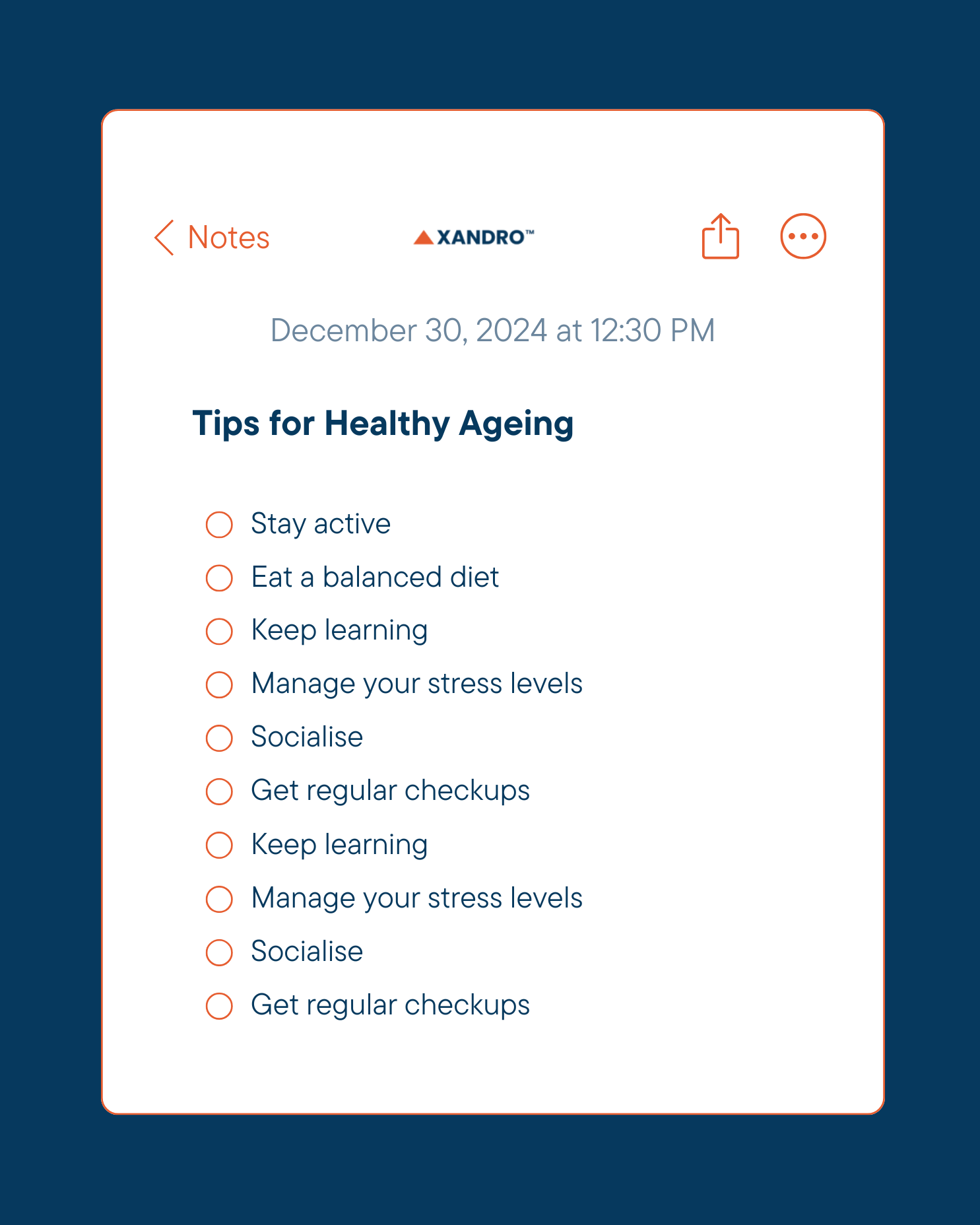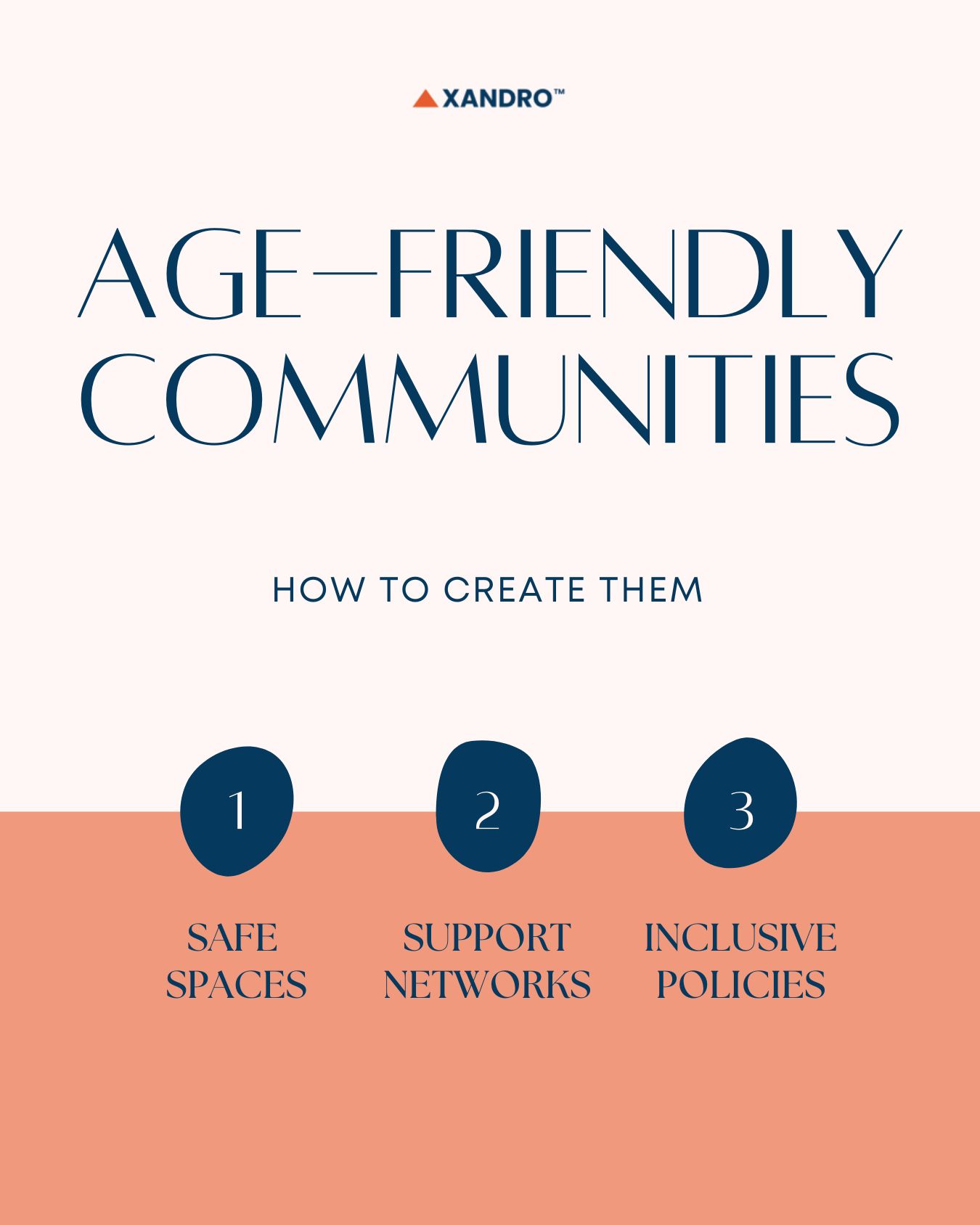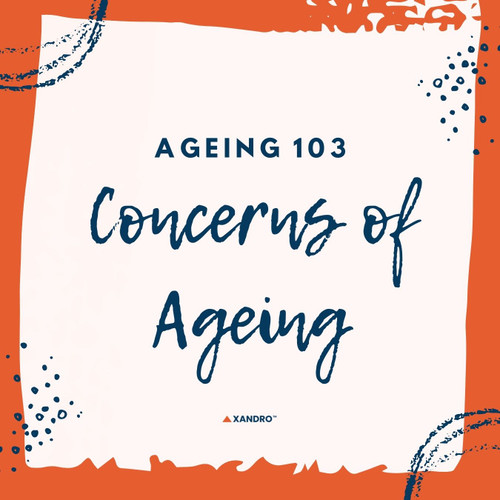Key Concerns of Ageing: Health Problems & Tips for the Elderly
23rd Dec 2024
Ageing 103: The Key Concerns of Ageing
Growing older is a natural part of life, but it comes with unique challenges and changes. While it’s impossible to avoid all the effects of ageing, understanding the key concerns can help individuals, families and communities better support the older population. This guide breaks down ageing-related concerns in simple terms and offers practical insights for living well during later years.
Products mentioned in this blog:
Further Reading: Longevity Pathways
Jump there now:
- What Happens When We Age?
- Common Health Concerns in Older Adults
- 10 Tips for Healthy Ageing
- Creating Age-Friendly Communities
- It’s Time for A New Perspective on Ageing
Ageing is more than just adding candles to your birthday cake. At a biological level, it’s the result of wear and tear on your cells and tissues over time. Over time, our cells build up damage from environmental factors, lifestyle choices and even natural processes within the body. This damage affects how well our organs and systems function, but ageing is not just about biology; it’s shaped by our environment, lifestyle and even our outlook on life.
These gradual changes of ageing can lead to reduced physical strength, slower thinking and a higher risk of illness, but here’s the important part: ageing doesn’t affect everyone the same way.
Some 80-year-olds feel as spry as they did at 50, while others face physical or mental challenges much earlier. This diversity depends on many factors, like genetics, environment, lifestyle choices and access to healthcare, so there are many factors influencing ageing.
Further Reading: Ageing 101: The Hallmarks of Ageing
Thanks to medical advances, people are living longer than ever. By 2050, the number of people over 60 will double and one in six people worldwide will be in this age group. The challenge isn’t just living longer but living healthier.
The thing is, several health conditions become more common with age. Knowing what to watch for can lead to earlier detection and better management. Here are some key issues facing the elderly:
1. Heart Problems
The heart works hard throughout life, but as we age, it becomes more prone to problems like high blood pressure, heart disease and stroke. Staying active, eating heart-friendly foods and visiting the doctor for regular checkups can keep your ticker in good shape.
To help improve blood pressure regulation and heart health, check to see if Trans Resveratrol 500mg may benefit you.
2. Cancer
As we get older, the risk of developing cancer increases. This happens because our cells go through more wear and tear over time, which can lead to mistakes when they grow and divide. These mistakes can sometimes cause cells to grow out of control and mutate, forming tumours or spreading to other parts of the body. Common cancers in older adults include breast, prostate, lung and colon cancer.
While old age increases risk, early detection and regular check-ups can make a big difference. Treatments like surgery, radiation or medication are more effective when cancer is caught early. Living a healthy lifestyle — such as eating nutritious foods, staying active, avoiding smoking and limiting alcohol — can also help lower the risk of cancer as we age.
3. Cognitive Decline
It’s normal for memory, multitasking and problem-solving skills to slow down with age, but severe issues like dementia or Alzheimer’s are not part of normal ageing. These conditions can make everyday tasks difficult, but early diagnosis and specialised care can improve quality of life. Staying mentally active through reading, puzzles or learning new skills can help keep the brain sharp.
LPC Neuro is Xandro’s solution to brain and cognitive decline, using patented Lysoveta™ to transport omega-3s directly into the brain to support brain health.
Further Reading: All About LPC Neuro for Brain Health

Achy joints are common in older adults, but arthritis is more than just stiffness. It’s a condition that can limit movement and independence if not treated. Physical therapy, medication and a healthy weight can help manage symptoms.
For anti-inflammatory support, BCM-95® Turmeric Curcumin 400mg helps reduce joint pain and joint-related diseases, as well as helps prevent chronic diseases.
5. Chronic Pain
Years of hard work, injuries or stress on the body can lead to persistent pain. Chronic pain often lasts for months and affects daily life. Treatments like gentle exercise, therapy or medications can offer relief.
6. Vision and Hearing Loss
Reading the fine print or hearing conversations in noisy places can become harder as you age, which can affect independence and quality of life. Conditions like cataracts, glaucoma or hearing loss are common as we age, but regular screenings and assistive devices (like glasses or hearing aids) can help.
Further Reading: Ageing 102: The Signs of Ageing
7. Vision and Hearing Loss
Joints wear out, muscles weaken and bones lose density as we age. These changes make us more prone to falls and injuries. Doing gentle exercises like yoga, swimming or walking can strengthen muscles, improve balance and protect against these risks.
Boost your bone health, muscle mass and wound healing by taking Calcium AKG 500mg!
8. Mental Health Issues
Feelings of loneliness, depression or anxiety aren’t uncommon in older adults. These emotions can stem from physical health problems, social isolation or life changes like retirement or the loss of loved ones, which can increase the risk of heart disease and cognitive decline. Ageism and a loss of sense of purpose can also lead to a decline in self-worth. Talking about mental health, staying socially active, seeking support and practicing mindfulness can make a world of difference.
9. EconomicIssues
With no working income and only relying on savings, superannuation and pension, which differs from country to country, this can eat away at one’s mental health and quality of life. There are also increased healthcare costs as you face a higher risk of health issues and a feeling of dependency, especially as changes in the economy can impact individual financial security and access to resources for ageing populations. There are end-of-life preparations, which can be costly, legally challenging and emotional.
- Stay Active: Regular physical activity strengthens muscles, improves heart health and boosts mood.
- Eat Well: Make sure to eat a balanced diet full of fruits, vegetables, whole grains and lean proteins to support your overall health.
- Keep Learning: Staying mentally active — whether through reading, puzzles or hobbies — keeps your brain sharp.
- Manage Stress: Do yoga or write in a journal to reduce the stress on your body as your age.
- Socialise: Strong connections with family, friends or community groups can reduce feelings of isolation and improve mental well-being.
- Get Regular Checkups: Early detection of health problems is key. Don’t skip those doctor visits!
- Sleep: Getting enough sleep helps your body repair itself and makes your brain and body refreshed for each day.
- Prevention: Make sure there are no tripping hazards in your home to avoid falls that can have detrimental effects.
- Look After Your Teeth: Poor dental health can lead to gum disease, which has been linked to diabetes, heart disease, stroke and arthritis.
- Take Supplements: As you age, you don’t eat as much and sometimes it can be hard to get all the required vitamins and minerals, so taking supplements can help you get your daily requirements.
Further Reading: What Ingredients to Look Out For to Help With Longevity

As the global population grows older, we face both challenges and opportunities. Ageing societies require healthcare systems, communities and economies to adapt, but older individuals also bring immense value to their families and societies, from sharing wisdom and mentoring to contributing to volunteer efforts and childcare.
Ageing well isn’t just about individual choices; it’s also about the environment we live in. Communities that prioritise older adults can make a huge difference, including:
- Safe Spaces: An ageing society means accessible buildings, parks, and transport make it easier for older people to stay active and involved.
- Support Networks: Programs that connect older adults with resources or companions can reduce loneliness.
- Inclusive Policies: Governments can support ageing populations through healthcare, housing, and social services.
Countries like Japan and Singapore are leading the way in creating ‘age-friendly’ cities with accessible infrastructure, community support systems and policies that promote healthy ageing. These efforts not only improve individual well-being but also benefit society as a whole.
Singapore, for example, is deemed a ‘man-made’ blue zone, with the country doubling its number of centenarians in the past 10 years. Read more about how Singapore became a blue zone.

Ageing can be a deeply emotional journey. It’s a time to reflect on life’s achievements, face regrets and adapt to new realities. Maintaining a sense of purpose during this time is incredibly important. Whether it’s through deepening relationships, pursuing passions, exploring spirituality or setting new goals, finding meaning in later life can make this stage fulfilling.
The most important thing? Recognising that older adults are not a burden but a vital part of society. With the right support, older people can live meaningful, independent lives and contribute greatly to their communities.
To help with overall ageing, Xandro’s Protocol X is an all-in-one daily nutrition boost full of science-backed longevity ingredients. It targets 11 vital body functions and comes in convenient, travel-friendly sachets. Learn more about Protocol X here.
End Note
Ageing is a journey we all take and preparation makes the road smoother. By understanding common health concerns, adopting healthy habits and building supportive communities, we can make sure these years are fulfilling and dignified.
Whether you're planning for your own future or caring for a loved one, remember: ageing isn’t just about adding years to life, but adding life to years.
Research into ageing is advancing rapidly. Scientists are looking into old age health problems and solutions, and are uncovering ways to slow cellular damage, improve cognitive health and even reverse certain ageing processes. Until these breakthroughs become mainstream, though, the focus remains on living well in the present.
Products mentioned in this blog:
